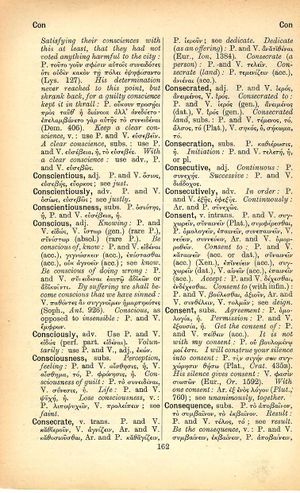consent
English > Greek (Woodhouse)
v. intrans.
P. and V. συγχωρεῖν, συναινεῖν (Plat.), συμφέρεσθαι, P. ὁμολογεῖν, ἐπαινεῖν, συνεπαινεῖν, V. νεύειν, συννεύειν, Ar. and V. ὁμορροθεῖν.
Consent to P. and V. καταινεῖν (acc. or dat.), συναινεῖν (acc.) (Xen.), ἐπινεύειν (acc.), συγχωρεῖν (dat.), V. αἰνεῖν (acc.), ἐπαινεῖν (acc.).
Accept: P. and V. δέχεσθαι, ἐνδέχεσθαι.
Consent to (with infin.); P. and V. βούλεσθαι, ἀξιοῦν, Ar. and V. συνθέλειν, V. τολμᾶν; see deign.
subs.
Agreement: P. ὁμολογία, ἡ.
Permission: P. and V. ἐξουσία, ἡ.
Get the consent of: P. and V. πείθειν (acc.).
It is not with my consent: P. οὐ βουλομένῳ μοί ἐστι.
I will construe your silence into consent: P. τὴν σιγήν σου συγχώρησιν θήσω (Plat., Crat. 435B).
His silence gives consent: V. φασὶν σιωπῶν (Eur., Or. 1592).
With one consent: Ar. ἐξ ἑνὸς λόγου (Plut., 760); see unanimously, together.

